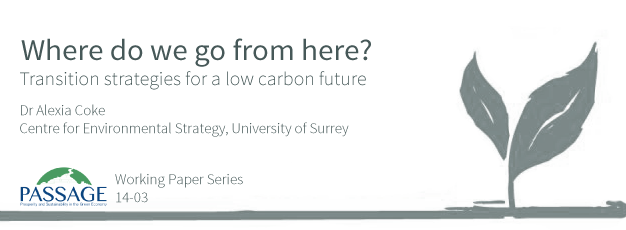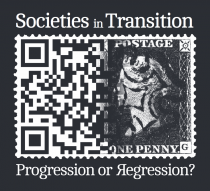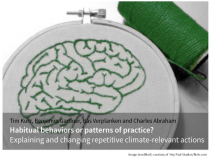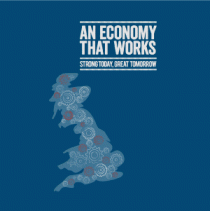- About
- Team
- Projects
- Children and the Environment
- ELiCiT (Exploring lifestyle changes in transition)
- Foundations for Sustainable Living
- HABITs
- Mapping Rebound Effects
- PASSAGE (Prosperity and Sustainability in the Green Economy)
- Policy Dialogue
- Price Responsiveness of Demand in Energy
- Resilience and Sustainable Lifestyles
- Sustainability Transitions in Food Systems
- Sustainable Living in Remote Rural Scotland
- Publications
- News
- Events
Transition strategies for a low carbon future

This working paper outlines the main findings of a qualitative PhD research carried out within the ESRC funded research project RESOLVE. It explores the strategies for a low carbon future being adopted within the UK Transition movement and highlights potential policy, practice and academic learning in relation to community action on climate change and resource scarcity.
The research focused in particular on the food, energy and transport activities that Transition Initiatives (local groups) are undertaking within Britain.
The research involved:
-
in-depth interviews with 35 ‘grassroots activists’ from 18 different Transition Initiatives in England;
-
‘observant-participation’ (Moeran 2009) – I attended over 25 local, regional and national Transition events and meetings, and was actively involved in attempting to start two Transition Initiatives;
-
analysis of many of the materials produced by the Transition Network, in particular its books and films; I also followed a number of Transition Initiative websites as well as Rob Hopkins’ blog, Transition Culture.
Drawing on concepts that have been established as a result of studying other social movements, the research found five main emerging and interlinked strategies that are being adopted within the Transition movement. The first three of these strategies are focused on mobilising people to become involved in the movement (mobilising strategies), whilst the other two are focused on promoting particular forms of collective action (action strategies) for particular types of change (change strategies).
About
Dr Alexia Coke is a visiting fellow at the University of Surrey and former PhD researcher within the ESRC funded research project RESOLVE, lead by Prof Tim Jackson.
Download
Coke, Alexia 2014.  Where do we go from here? Transition strategies for a low carbon future. PASSAGE Working Paper 14/03. Guildford: University of Surrey.
Where do we go from here? Transition strategies for a low carbon future. PASSAGE Working Paper 14/03. Guildford: University of Surrey.
Related links
-
Explore the Transition Network
-
See individual initiative: Transition Town Totnes.













